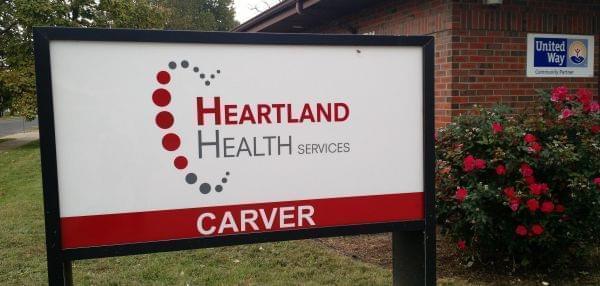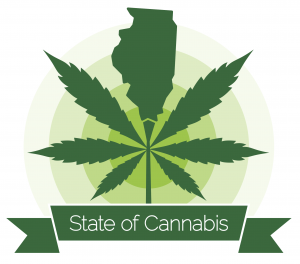Cannabis Merges Into Health Care

The Carver office of Heartland Health Services is located on W. John Gwynn Jr. Ave. in Peoria. Tanya Koonce/Peoria Public Radio
We are taking a closer look at what the legalization of cannabis could mean for Illinois. The State of Cannabis is a collaborative reporting effort by public radio stations across the state. This piece in the series looks at the potential health care considerations of recreational marijuana.

This story is part of a weeklong series from Illinois public radio stations focusing on the potential impact of marijuana legalization.
Tanya Koonce from Peoria Public Radio talks with Dr. Gregg Stoner, the chief medical officer of Heartland Health Services. Stoner manages the federally funded health care agency that includes nearly 30 doctors and physicians assistants. Last year the agency served more than 23,000 people and had more than 75,000 office visits.
Stoner said the agency does not prescribe medical marijuana in part because it would have been inundated with requests. Rather, he says, the health care providers of the agency refer patients with qualifying conditions to other doctors for medical marijuana cards.
“Even if Illinois legalizes recreational marijuana and even though it’s legalized medical marijuana, we would be violating federal law by certifying it. So that’s another major reason that we don’t prescribe it," Stoner said.
Reporter: What concerns do you generally have about patients who haven’t used cannabis before, but are considering it and now may be able to get it and won’t need a referral for the prescription drug card?
Stoner: People that have not tried marijuana and yet they have a condition they feel might benefit from the use of marijuana will try it, if it’s truly legal in the state for recreational use and they will either benefit from it or they won’t. And we hear different responses from people because people use it pretty widely in our population and some people say it helps and some people say it doesn’t help whatever they have. And so I think they will individually experiment and find out if it helps them at all.
Reporter: Is the use of marijuana—medically prescribed or otherwise—a conversation now that doctors are having with their patients, just as doctors have conversations about alcohol use?

Dr. Gregg Stoner is chief medical officer at Heartland Health Services.
Stoner: Any given patient that we have that’s on a controlled substance we do a urine toxicology on them, at least yearly, and we often see marijuana in their urine toxicology. I don’t know the number, but it’s probably well over 50% of our patients. Given that, there’s actually a variance in our different providers in how they approach this. There are some who truly believe that this is a gateway drug and they don’t want to encourage its use under any circumstances, and they’ll discontinue other controlled substances if the urine toxicology is positive for marijuana. And some of our other providers actually accept the fact that people are going to use marijuana although illegally and still continue to manage whatever problem that is requiring their ongoing controlled substance use.
Reporter: What other concerns might you have relative to the potential legalization of recreational marijuana?
Stoner: There are a couple of major concerns. One is, the effect on people’s behavior. It seems to be an anti-motivating drug. In countries that have legalized marijuana they see fewer people completing their college education. They see a higher rate of people going on Medicaid. They see, just kind of a decline in people’s ambition to succeed.
The other concern is the effect on reaction time and driving ability. Auto accidents go up in areas where marijuana is legalized. I don’t know how the state is going to test for that. Because blood alcohol levels change quickly but marijuana stays in the body for a long time as far as being detected. So someone who smokes marijuana three or four weeks ago, it will still be positive in their urine. So I don’t know how it will affect our traffic laws and in convicting people of driving under the influence of marijuana, but that will certainly happen.
Then the other thing is kind of the gateway effect. Is marijuana a gateway drug? Studies show that it indeed is. Teenagers who use marijuana are much more likely to use cocaine and can progress on to other drugs. Many people don’t, but it can happen, especially when it is used in the teenage years.
